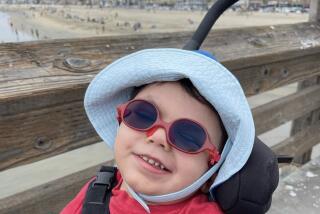The case of the feral child
- Share via
“Fringe”
Fox, Tuesday, April 7, 9 p.m.
Episode: “Inner Child”
--
The premise
A boy is found naked in a tunnel that has been sealed off for many years. He appears to be about 10 years old and is hairless, pale and emaciated. He is brought to Boston Children’s Hospital, where he is given oxygen because of apparent breathing difficulties. But FBI advisor Dr. Walter Bishop (John Noble) warns that the boy, instead, must be deprived of oxygen, because he has been living in a low-oxygen environment and has adapted to it. His lungs could easily fill with fluid, the doctor warns, if he receives too high a concentration of oxygen. The boy is switched to a low-oxygen mixture, and he begins to breathe more easily. The plan is to increase his oxygen supply by 10% per hour.
Further examination of the child reveals that his intestines lack Lactobacillus acidophilus bacteria, which aid in digestion, and that he has low blood levels of vitamin D -- both of which are attributed to his underground existence. He apparently survived by eating insects and rodents. His blood pressure is normal and his heart, kidneys and ear drums are intact; though he can hear and see, he doesn’t speak. He is sensitive to light, sound and emotions. He is also an empath -- and can anticipate when crimes are about to occur.
Medical questions
Could a child survive underground for years, deprived of regular food and human contact? What would be the physical and emotional impact? Could such deprivation lead him to be empathic or even psychic? Would he have to adjust slowly to higher percentages of oxygen? Why would he be hairless? Mute? Would he be deprived of vitamin D and lactobacillus?
The reality
There are many real-life stories about feral children, so such an existence isn’t completely out of the question. But a life deprived of human contact would lead to an extreme inability to relate to other humans, not an innate sensitivity toward them.
“He could physically survive, assuming there was a food and water supply,” says Charles A. Nelson III, chairman in pediatric developmental medicine research at Children’s Hospital Boston. “But as for his psychological health, sensory deprivation would soon wreak havoc on the nervous system. It would likely be only weeks before anxiety morphed into psychosis.”
Rachel Yehuda, a professor of psychiatry at the Mt. Sinai School of Medicine in New York and an expert in post-traumatic stress disorder, has taken care of a patient who as a child famously survived for months in the sewers of Lvov, Poland, during World War II eating rodents and insects. But that patient was older when the isolation began and was in the presence of adult caretakers. Yehuda adds that the emotional impact of total isolation would lead to rapid confusion and the inability to care for one’s physical needs. “I don’t think a child alone could generally survive for more than a few months,” she says.
As for the possibility of muteness, Nelson says, an isolation of 10 years or more would be necessary to instill such a loss of language. But the child could be selectively mute, meaning that he doesn’t speak for psychological reasons.
It is possible to acclimate to lower levels of oxygen as the child apparently does, says Dr. Francis V. Adams, a pulmonologist at NYU Langone Medical Center and author of the “Asthma Sourcebook.” Long-term oxygen deprivation has been seen among Andean and Himalayan natives, who compensate with physiological changes, including more red blood cells and enlarged hearts. But the notion that the child would have to reacclimate slowly to normal oxygen concentrations is pure fiction. “It is safe to administer higher levels of oxygen [up to 60%] to correct a low oxygen state,” Adams says. “It is only at concentrations greater than 60% that oxygen may prove toxic and produce fluid in the lungs.”
The child could easily develop a vitamin D deficiency from the lack of sunlight and inadequate nutrition. The lactobacillus deficiency would be less likely. A patient with such a deficiency would develop lactose intolerance with diarrhea, bloating and abdominal pain. Although lactobacillus are generally absent in newborns, even a completely isolated child would usually have them, especially if he was compelled to eat rodents (which contain this bacteria). Finally, though severe vitamin and mineral deficiencies can be associated with extensive hair loss, there is no real-world nutritional deficiency that would explain this child being hairless.
As for the potential for psychic abilities, the show is science fiction after all.
--
Siegel is an associate professor of medicine at New York University’s School of Medicine. [email protected]
More to Read
Sign up for Essential California
The most important California stories and recommendations in your inbox every morning.
You may occasionally receive promotional content from the Los Angeles Times.










